
|
|

|
All Questions Topic List |
IntegrationQuestion and Answers: Page 37 |
Question Number 172088 Answers: 1 Comments: 0
|

|
Question Number 172072 Answers: 0 Comments: 0
|
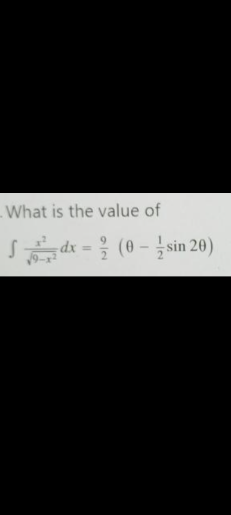
|
Question Number 172013 Answers: 1 Comments: 0
|
| find:
∫xe^(−ax) ax
|
|
Question Number 172012 Answers: 1 Comments: 0
|
| find
∫e^x sinxdx
|
|
Question Number 172011 Answers: 1 Comments: 0
|
| find integrate:
∫x^2 e^x dx
|
|
Question Number 172010 Answers: 1 Comments: 0
|
| find integrate:
∫xe^x dx
|
|
Question Number 171971 Answers: 2 Comments: 0
|
| ∫(x/(x^2 +4x+3)) dx=...
|
|
Question Number 171910 Answers: 3 Comments: 0
|
| ∫ (dx/(9 − 4x^2 ))
using the trigonometric substitution.
|
|
Question Number 171727 Answers: 3 Comments: 0
|

|
Question Number 171708 Answers: 1 Comments: 0
|
| ∫_0 ^∞ 2x−3 dx=...
|
|
Question Number 171601 Answers: 0 Comments: 0
|

|
Question Number 171565 Answers: 0 Comments: 4
|

|
Question Number 171560 Answers: 1 Comments: 1
|
|
Nice Integral
Ω = ∫_0 ^( (π/4)) (( tan(x))/(( cos^( 2) (x) + 2sin^( 2) (x))))dx =
|
|
Question Number 171442 Answers: 0 Comments: 1
|
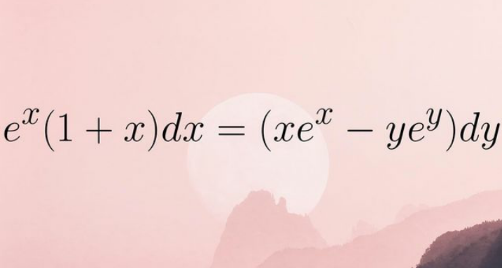
|
Question Number 171395 Answers: 1 Comments: 2
|
| ∫_(−∞) ^(+∞) (x^2 /(1+x^4 ))dx
|
|
Question Number 171392 Answers: 0 Comments: 1
|
| ∫_0 ^(π/2) ((cos x)/((1+(√(sin 2x)) )^3 )) dx =?
|
|
Question Number 171371 Answers: 3 Comments: 0
|
| ∫_(−∞) ^(+∞) (dx/(1+x^4 ))=?
|
|
Question Number 171367 Answers: 0 Comments: 0
|
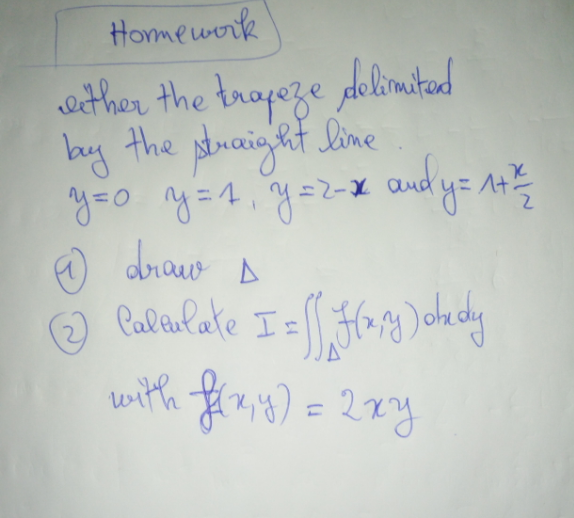
|
Question Number 171301 Answers: 0 Comments: 1
|
| ∫_1 ^2 6x^2 −2x+3
|
|
Question Number 171260 Answers: 1 Comments: 0
|
| Change to polar coordinates:
∫^( 4a) _0 ∫_(y^2 /4a) ^a (((x^2 −y^2 )/(x^2 +y^2 ))) dx dy
|
|
Question Number 171253 Answers: 2 Comments: 0
|

|
Question Number 171213 Answers: 0 Comments: 0
|
| In electricity, the electrostatic field
is defined as:
E = ∫_0 ^π [((a^2 σ sin θ)/(2ε(√(a^2 −x^2 −2ax cosθ))))]dθ
where a,σ and ε are constants. Consider
that x>a and show that E= ((a^2 σ)/(εx))
|
|
Question Number 171198 Answers: 1 Comments: 0
|
|
evaluate
∫_0 ^( π) log (a+cos x)dx
|
|
Question Number 171171 Answers: 1 Comments: 2
|
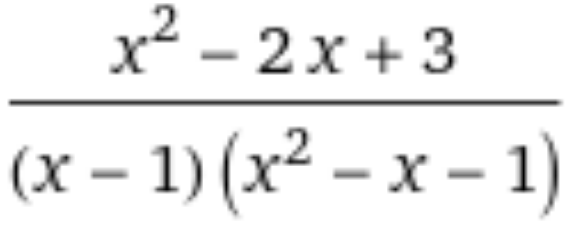
|
Question Number 171130 Answers: 0 Comments: 0
|

|
Question Number 171125 Answers: 1 Comments: 0
|
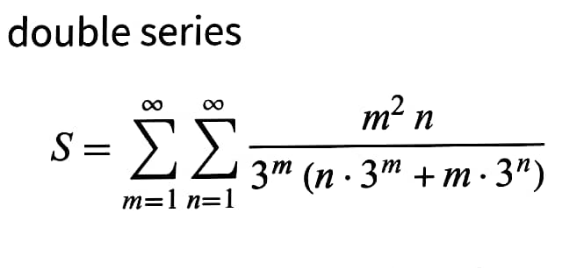
|
Pg 32
Pg 33
Pg 34
Pg 35
Pg 36
Pg 37
Pg 38
Pg 39
Pg 40
Pg 41
|
Terms of Service |
Privacy Policy |
Contact: info@tinkutara.com |






















